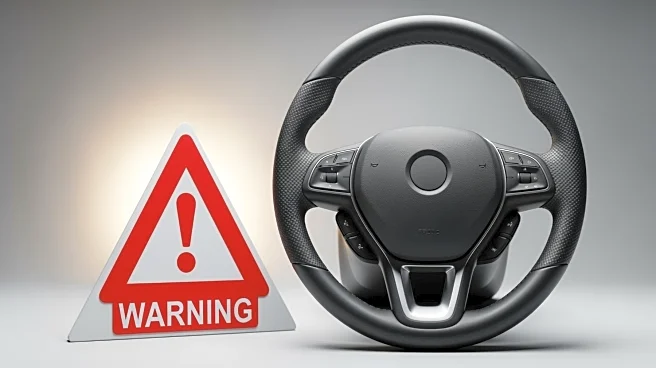What's Happening?
European cities and civil society organizations have raised concerns over the European Union's intention to accept lower US vehicle standards. This move, part of a trade deal agreed over the summer, would
allow mutual recognition of vehicle standards between the US and the EU. Cities like Paris, Brussels, and Amsterdam, along with over 75 civil society groups, have expressed that this decision could undermine the EU's leadership in road safety, public health, and climate policy. The EU has seen a 36% reduction in road deaths since 2010 due to stringent safety regulations, while the US has experienced an increase in road fatalities. The EU's mandatory safety technologies, such as pedestrian protection and automated emergency braking, are at risk of being compromised. Additionally, the EU plans to impose limits on pollution from brake and tire wear by 2026, contrasting with the US's move to weaken air pollution rules.
Why It's Important?
The acceptance of lower US vehicle standards by the EU could have significant implications for road safety and public health in Europe. The potential increase in dangerous vehicles could reverse decades of progress in reducing road fatalities. Furthermore, weaker pollution standards could lead to increased exposure to harmful pollutants, affecting public health with conditions like asthma and cancer. Economically, this shift could threaten jobs in the EU automotive industry, as production may move to the US where standards are lower. This could result in job losses across Europe's automotive supply chain, impacting major brands like BMW and Mercedes.
What's Next?
The European Commission is working to tighten regulations to prevent oversized US vehicles from entering the EU market without meeting safety and pollution standards. The signatories of the letter urge EU lawmakers to oppose the acceptance of lower US standards and to affirm that EU vehicle standards are non-negotiable. This ongoing debate may lead to further discussions and potential revisions of the trade deal to ensure that European safety and environmental standards are maintained.
Beyond the Headlines
The decision to accept lower US vehicle standards could have long-term implications for the EU's global leadership in automotive safety and environmental policy. It raises ethical questions about prioritizing trade agreements over public health and safety. Additionally, it could influence cultural perceptions of vehicle safety and environmental responsibility in Europe, potentially affecting consumer trust and market dynamics.










